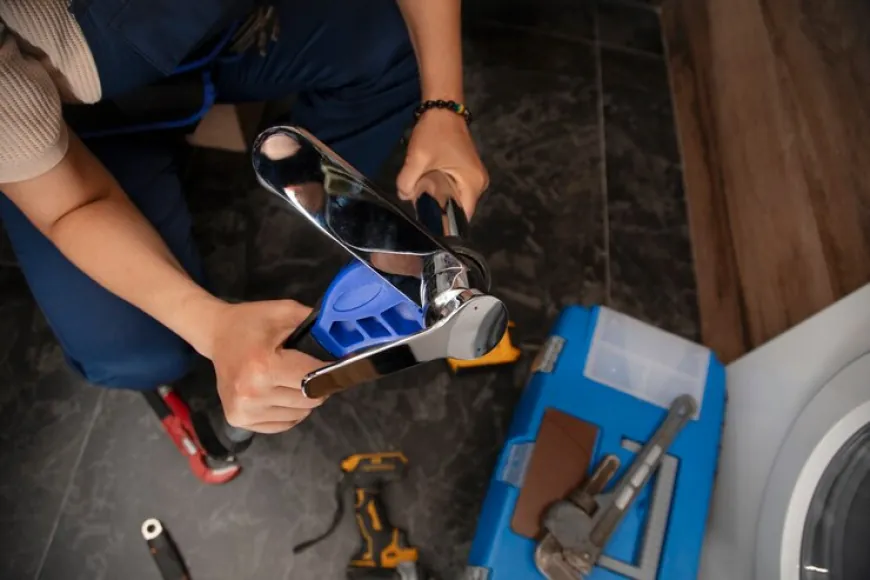Choosing the Right Downspout Style and Material for Your Home
Finding downspout installation services near me can help ensure your downspouts are correctly installed, aligned, and secured to maximize efficiency.

Downspouts play an essential role in any effective gutter system, diverting water away from the foundation and protecting the property from potential water damage. Choosing the right downspout style and material can make a big difference in your home’s water management and curb appeal. From traditional rectangular downspouts to more decorative round options, each style and material has its own advantages and considerations, making it crucial to select the one that best suits your home’s architecture, local climate, and maintenance preferences.
Why Consider Professional Downspout Installation Services?
When considering the best options for downspouts, it’s essential to work with experts who understand the specific needs of your home and local environment. Finding downspout installation services near me can help ensure your downspouts are correctly installed, aligned, and secured to maximize efficiency. Professionals can also guide you in choosing the best style and material, ensuring your downspouts not only look great but also effectively protect your home from water damage.
Key Factors to Consider When Choosing a Downspout Style
Selecting a downspout involves balancing aesthetics, functionality, and climate compatibility. Here are some of the key downspout styles and factors to consider:
-
Rectangular Downspouts: These are the most common style, typically found in standard gutter installations. Rectangular downspouts have a straightforward design and are highly effective at channeling water away from the foundation. They blend well with various architectural styles and are available in multiple sizes, making them a versatile choice.
-
Round Downspouts: Round downspouts offer a more decorative look that complements older homes or specific architectural styles. They are less common than rectangular downspouts but provide an equally effective water channeling system. Round downspouts are a good choice if you want a more traditional look, and they are often paired with round gutters for a cohesive design.
-
Decorative Downspouts: If you’re looking for a unique or customized appearance, decorative downspouts offer many possibilities. These can include custom designs, decorative spouts shaped like animals or sculptures, or even custom metalwork. Though more expensive, decorative downspouts can enhance curb appeal and serve as a unique feature for your home’s exterior.
-
Flexible Downspouts: Flexible downspouts are typically used in areas that require temporary or adjustable water diversion. They are especially useful for homeowners who may want to move downspouts or extend them as needed. While not typically used as a permanent solution, flexible downspouts are useful for quick adjustments or as a temporary fix in specific situations.
Material Options for Downspouts
When it comes to downspout materials, each type has its advantages and drawbacks. Here’s a breakdown of popular materials and what makes each one suitable for different needs:
-
Aluminum Downspouts: Aluminum is one of the most popular materials for downspouts because it’s lightweight, rust-resistant, and affordable. Aluminum downspouts can be painted to match the color of your home, and they are highly durable in most climates. However, aluminum can be dented or damaged by impact, so it may require replacement if it suffers significant wear.
-
Vinyl Downspouts: Vinyl downspouts are an affordable and lightweight option, popular for DIY installations. They are available in various colors, easy to cut, and simple to install. However, vinyl can become brittle in extreme temperatures, especially in colder climates. Homeowners in very hot or very cold areas might find that vinyl downspouts need to be replaced more often than other materials.
-
Steel Downspouts: Galvanized steel is a strong, durable option for downspouts. Steel downspouts resist impact damage better than aluminum, making them a good choice for areas prone to heavy storms or where impact resistance is a concern. However, steel downspouts are prone to rust if not properly maintained, so they may require more upkeep to remain in good condition.
-
Copper Downspouts: Copper is a premium material for downspouts, known for its long-lasting durability and beautiful appearance. Copper downspouts develop a green patina over time, adding a distinct look to a home’s exterior. They are more expensive than other materials, but they can last for decades with minimal maintenance. Copper is ideal for homeowners seeking a high-end look and who are willing to invest in a premium material.
-
Zinc Downspouts: Zinc downspouts are highly durable and resist corrosion, making them a low-maintenance option. Like copper, zinc develops a patina over time, which protects the material and adds a natural, weathered look. Zinc is less common than other materials, but it is an excellent choice for homeowners who want a unique, long-lasting downspout with a natural aesthetic.
Sizing Your Downspouts Properly
Choosing the right size for your downspouts is critical to ensuring that your gutter system functions correctly. Downspouts that are too small can lead to overflow, while oversized downspouts may be unnecessary and affect the aesthetics of your home. The size of your downspouts depends on the amount of rainfall in your area, the size of your roof, and the capacity of your gutter system.
Typically, 2x3-inch downspouts are suitable for smaller roofs, while 3x4-inch downspouts can handle larger volumes of water, making them ideal for bigger homes or areas with frequent heavy rainfall. Consulting with a professional can help you choose the optimal size for your specific needs.
Matching Downspouts to Your Gutter System
When choosing downspouts, it’s essential to consider how they’ll match your existing gutter system. For example, half-round gutters pair well with round downspouts for a consistent, cohesive appearance, while K-style gutters are often matched with rectangular downspouts. Ensuring that your downspouts align well with your gutters not only maintains the aesthetic of your home but also maximizes the efficiency of water drainage.
Enhancing Downspouts with Extensions and Accessories
To further protect your home’s foundation and landscaping, you may want to add downspout extensions or accessories. Here are a few popular options:
-
Downspout Extensions: These extensions carry water further away from your home, preventing water from pooling around the foundation. Extensions come in both rigid and flexible types and can be adjusted as needed.
-
Splash Blocks: Splash blocks are placed at the end of downspouts to direct water flow away from the foundation. They help distribute water evenly and prevent soil erosion.
-
Rain Barrels: For eco-conscious homeowners, attaching a rain barrel to a downspout can allow you to collect and reuse rainwater for gardening or other outdoor purposes.
Benefits of Choosing the Right Downspout Style and Material
The right downspout style and material ensure that your home is protected from water damage, help improve curb appeal, and reduce the need for frequent repairs. Here’s a quick recap of the benefits:
-
Enhanced Water Flow and Drainage: Properly sized and installed downspouts ensure that rainwater flows efficiently, minimizing risks of water overflow and damage.
-
Reduced Maintenance: Choosing the right material can help reduce maintenance needs. For example, copper and zinc require minimal upkeep, while materials like vinyl may need more frequent attention in extreme climates.
-
Improved Curb Appeal: Matching the style and color of downspouts with your home’s exterior enhances curb appeal and adds value to your property.
-
Extended Lifespan of Gutter System: Downspouts play a significant role in the longevity of your overall gutter system. Choosing durable materials and styles that suit your climate means that your gutters will last longer without the need for replacements.
Final Thoughts
Selecting the right downspout style and material is an investment in your home’s protection and aesthetic. By evaluating the style, material, and size of downspouts, as well as considering local climate factors, you can choose an option that best meets your needs. Working with professionals who understand downspout installation ensures that your downspouts are installed correctly and provide effective, long-lasting water management. With the right downspouts, you’ll enjoy a beautiful, well-protected home for years to come.
What's Your Reaction?
 Like
0
Like
0
 Dislike
0
Dislike
0
 Love
0
Love
0
 Funny
0
Funny
0
 Angry
0
Angry
0
 Sad
0
Sad
0
 Wow
0
Wow
0














































